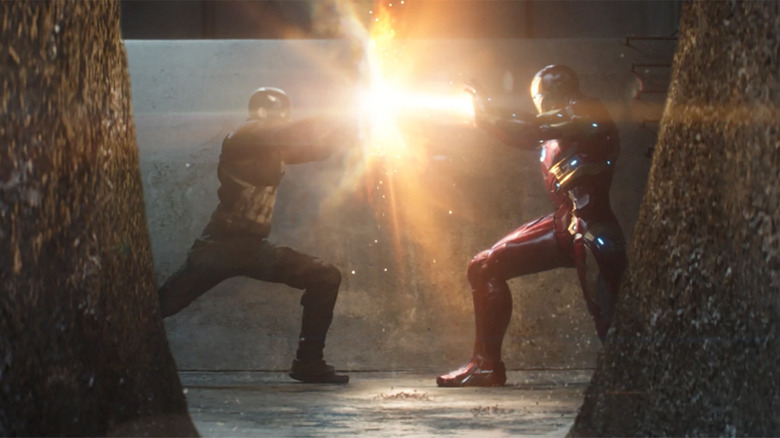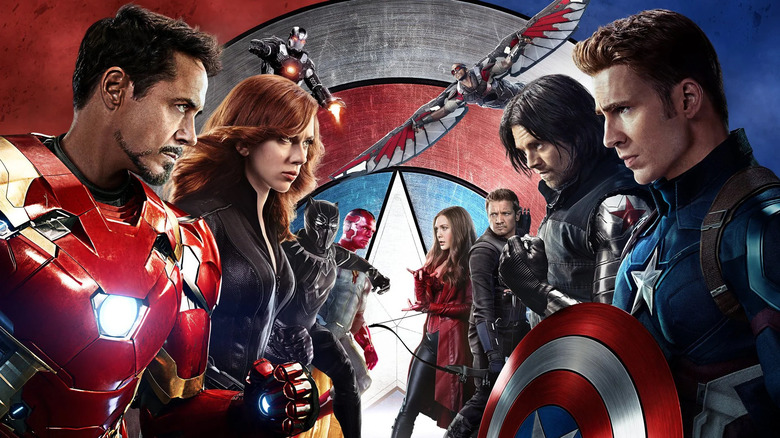
Back in 2015, we heard Marvel Studios president Kevin Feige almost walked away from the company due to ongoing disagreements with the Marvel Creative Committee about "Captain America: Civil War." This group situated at the Marvel Entertainment offices in New York consisted of Marvel Entertainment CEO Ike Perlmutter, president Alan Fine, Marvel Comics writer Brian Michael Bendis, Marvel Comics publisher Dan Buckley, and Marvel Entertainment CCO Joe Quesada, and they were constantly meddling in the affairs of Marvel Studios with terrible notes and worse ideas. At the time, all we heard was talk about the brass in New York wanting to scale down "Captain America: Civil War," but it was actually much worse than that.
The clash between Marvel Studios and the Marvel Creative Committee over "Captain America: Civil War" is chronicled in the new book "The Story of Marvel Studios: The Making of the Marvel Cinematic Universe." As the book explains, The Marvel Creative Committee had only become more demanding as the success of Marvel Studios continued, and they vehemently opposed the film's final act where Captain America and Iron Man fought each other. You know, the whole point of having a Civil War in the Marvel Cinematic Universe. That's when things really got ugly.
A Civil War Over Civil War

The Marvel Creative Committee, in all their infinite wisdom, didn't want Captain America and Iron Man coming to blows. Instead, they wanted The Avengers to reunite to battle the super soldiers that Baron Zemo led them to in a secret Hydra facility in Siberia. "Captain America: Civil War" co-writer Stephen McFeely recalls, "We had to do a draft where they had a fight in a submarine base with five super soldiers."
Directors Anthony & Joe Russo were not happy about this potential change to "Captain America: Civil War." Joe Russo said, "We kept saying, "There's nothing interesting about that film. We're not here to make that movie. We're not interested in telling another superhero story.'"
Kevin Feige found himself siding with the filmmakers. After years of playing nice and working as the go-between for the Marvel Creative Committee and the creatives at Marvel Studios, this was the straw that broke the camel's back when it came to negotiating and compromising with the executives in New York. This time there would be no negotiating. As Joe Russo said:
"Civil War started a civil war in Marvel. But when we drew the line in the sand, it became a moment where that company was either going to slowly bend back toward where it had come from, or it was gonna slowly start to bend toward new territory."
With the start date looming for the big budget superhero movie that was essentially on par with an assembly of The Avengers, Marvel Studios and the Marvel Creative Committee were at a stalemate. So the battle went all the way up to the head honcho at Disney. Chief Creative Officer Alan Horn brought in both parties to make their case about the trajectory of "Captain America: Civil War." Joe Russo recalled:
"The big thing I used to say all the time was, 'People tell you how much they love chocolate ice cream. You give it to them six days a week, they're gonna throw it in your face on day six. And the problem is, if you have three chocolate ice creams in the can at 200 million dollars a pop, you're screwed. So you better start figuring out ahead of time how to be disruptive."
As we all know, since we saw how "Captain America: Civil War" ended, Alan Horn sided with Marvel Studios. This was the beginning of the end for the Marvel Creative Committee constantly clashing with Marvel Studios. Not long after, the corporate structure at Marvel was changed in 2015 so that Kevin Feige and Marvel Studios reported directly to Alan Horn, and they didn't have to answer to the Marvel Creative Committee anymore.
Honestly, it's kind of a miracle that Marvel Studios was able to be as successful as they were for the first five years of their evolution when they had the Marvel Creative Committee whispering trash in their ear. Alan Horn not only made the right call on "Captain America: Civil War," but he made the future of Marvel Studios much easier to navigate. That's why Alan Horn's recent retirement from Disney has many wondering what the future holds for the House of Mouse and all its entities. Stay tuned.
Read this next: 11 Marvel Comics Villains We Really Want To See In The MCU
The post The Ending of Captain America: Civil War Was Almost Destroyed by the Marvel Creative Committee appeared first on /Film.
0 Commentaires